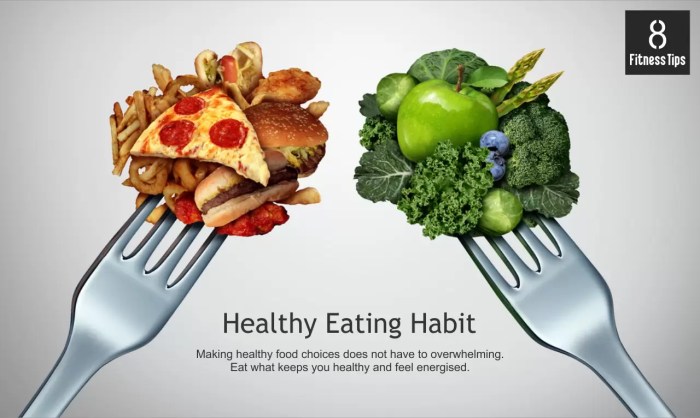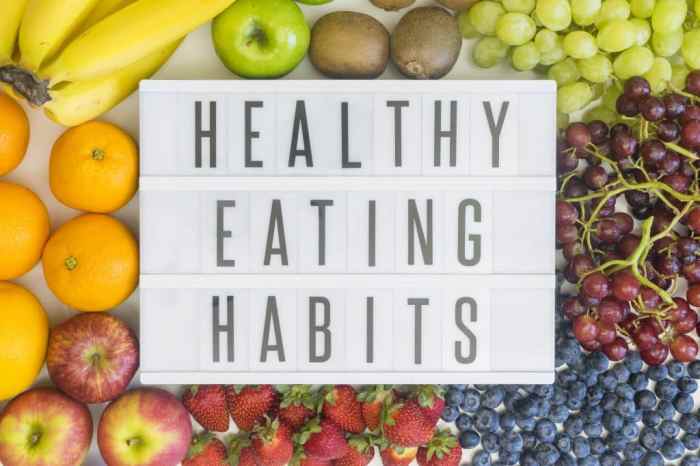Healthy Eating Habits are crucial for maintaining a balanced diet and overall well-being. Dive into the world of nutritious foods and smart choices with us!
Whether you’re a newbie or a health guru, there’s always more to learn about fueling your body right. Let’s explore the ins and outs of healthy eating habits together.
Benefits of Healthy Eating Habits
Eating right ain’t just about staying slim, it’s about fueling your body with the good stuff it needs to stay on top of its game. Let’s break it down for you!
Importance of Maintaining a Balanced Diet
Having a balanced diet means getting a mix of different nutrients that your body craves. It’s like giving your ride the right type of gas – you wouldn’t put diesel in a gas car, right?
Examples of Essential Nutrients, Healthy Eating Habits
- Protein: Builds those muscles so you can flex on ‘em.
- Fiber: Keeps things moving smoothly, if you catch my drift.
- Vitamins: Boosts your immune system like a shield against sickness.
- Minerals: Helps your body function like a well-oiled machine.
Contribution to Overall Well-being
Healthy eating habits ain’t just about looking good, it’s about feeling good too. When you feed your body right, you’re giving it the tools to stay energized, focused, and ready to take on whatever comes your way. It’s like having a secret weapon in your back pocket!
Building Healthy Eating Habits
Eating healthy is not just a one-time thing, it’s a lifestyle. Here are some tips on how to transition to a healthier diet:
The Role of Meal Planning
Meal planning plays a crucial role in establishing good eating habits. It allows you to make healthier choices and avoid impulsive decisions. By planning your meals ahead of time, you can ensure that you have nutritious options available and avoid the temptation of unhealthy snacks. This also helps in managing portion sizes and maintaining a balanced diet.
Impact of Portion Control
Portion control is key to maintaining a balanced diet. It’s not just about what you eat, but also how much you eat. By controlling your portions, you can prevent overeating and ensure that you are consuming the right amount of nutrients. It’s important to be mindful of portion sizes and listen to your body’s hunger cues to avoid unnecessary calories.
Common Obstacles to Healthy Eating: Healthy Eating Habits
Eating healthily can be challenging due to various obstacles that people face on a daily basis. From unhealthy food cravings to emotional eating, these obstacles can disrupt our efforts to maintain a balanced diet.
Unhealthy Food Cravings
Unhealthy food cravings are a common obstacle to healthy eating. These cravings often stem from a combination of physiological, psychological, and environmental factors. To overcome unhealthy food cravings, it is important to:
- Acknowledge the craving without giving in immediately.
- Identify the trigger behind the craving, whether it’s stress, boredom, or habit.
- Find healthier alternatives to satisfy the craving, such as snacking on fruits or nuts.
- Practice mindful eating to be more aware of your food choices and consumption.
Emotional Eating
Emotional eating is another obstacle that can disrupt healthy eating habits. Many people turn to food as a way to cope with emotions such as stress, sadness, or anxiety. To combat emotional eating, consider the following strategies:
- Identify your emotional triggers and find alternative ways to deal with them, such as exercising, meditating, or talking to a friend.
- Avoid keeping unhealthy comfort foods within easy reach, and stock up on nutritious options instead.
- Practice self-care and stress management techniques to reduce the urge to eat emotionally.
- Seek professional help if emotional eating becomes a persistent issue that affects your well-being.
Creating a Nutritious Meal Plan

To maintain a healthy lifestyle, it is crucial to plan your meals carefully and ensure they are well-balanced. A nutritious meal plan should include a variety of food groups to provide essential nutrients for your body to function optimally.
Components of a Well-Balanced Meal
A well-balanced meal typically consists of:
- Protein: such as lean meats, poultry, fish, beans, or tofu, to support muscle growth and repair.
- Vegetables: rich in vitamins, minerals, and fiber to promote overall health.
- Whole grains: like brown rice, quinoa, or whole wheat bread, for sustained energy levels.
- Fruits: for a natural source of sweetness, vitamins, and antioxidants.
- Dairy or dairy alternatives: like milk, yogurt, or fortified plant-based options, for calcium and vitamin D.
Ideas for Incorporating a Variety of Food Groups
To ensure you are getting a wide range of nutrients, try these ideas:
- Build a colorful salad with different veggies, fruits, nuts, and seeds.
- Prepare stir-fries with a mix of vegetables, protein, and whole grains.
- Snack on Greek yogurt with berries or veggies and hummus for a balanced option.
- Experiment with different herbs and spices to add flavor without excess salt or sugar.
Importance of Hydration
Hydration is a key component of a healthy eating routine as it helps regulate body temperature, transport nutrients, and flush out toxins. Aim to drink at least 8 cups of water per day and consider incorporating hydrating foods like fruits, vegetables, and soups into your meals.
Impact of Healthy Eating on Mental Health

Eating a nutritious diet not only benefits your physical health but also plays a crucial role in supporting your mental well-being. The food you consume directly affects your brain function, mood, and overall mental health.
Foods that Boost Mood and Cognitive Function
Consuming foods rich in omega-3 fatty acids, such as salmon, walnuts, and flaxseeds, can help improve mood and cognitive function. Additionally, dark leafy greens like spinach and kale are packed with vitamins and minerals that support brain health. Berries, rich in antioxidants, can also help reduce inflammation in the brain and improve cognitive function.
Link Between Gut Health and Mental Health
The gut-brain axis is a complex communication network between the gut and the brain that plays a significant role in mental health. Consuming a diet high in fiber, probiotics, and prebiotics can promote a healthy gut microbiome, leading to improved mental health outcomes. Fermented foods like yogurt, kefir, and kimchi are rich in probiotics that support gut health and may positively impact mood and cognition.